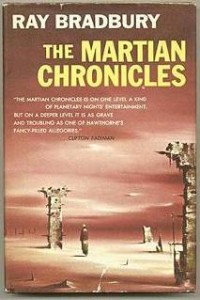The Martian Chronicles
 I read Ray Bradbury’s The Martian Chronicles for the Decades challenge. It’s a collection of short stories about a colonization of Mars that spans about 30 years. In the introduction, Bradbury cites Sherwood Anderson’s Winesburg, Ohio as his literary inspiration, another short story collection centering around a particular locale. At some point I’ll read that, too.
I read Ray Bradbury’s The Martian Chronicles for the Decades challenge. It’s a collection of short stories about a colonization of Mars that spans about 30 years. In the introduction, Bradbury cites Sherwood Anderson’s Winesburg, Ohio as his literary inspiration, another short story collection centering around a particular locale. At some point I’ll read that, too.
What would humanity do if it could start over on another planet? I didn’t enjoy the answers implied in this book much. The view of humanity is too dark for me. (I believe in original sin, so you know it must be pretty dark.) Apparently I’m in the minority. The front flap is just one example of the more typical response to this work: “Of all the dazzling stars in the vast Ray Bradbury universe, none shines more luminous than these masterful chronicles of Earth’s settlement of the fourth world from the sun.”
Why so hyperbolic? Perhaps it’s partly because the book was published in 1950, when the dark view of Earthlings in general, and the American lifestyle in particular, wasn’t as fashionable and common as it is now. Perhaps it’s because it’s a quick read that doesn’t get bogged down in characterization or subtlety (in fact it doesn’t even make an attempt at these things). Or perhaps it’s because even such an unsophisticated sci-fi reader as I can recognize the way these stories crawl under the skin and evoke strong feelings — sometimes laughter, sometimes horror (of the pleasantly shivering variety), sometimes startlement (?) at its novelty. Some of the stories would make great Twilight Zone episodes. (Maybe some have…?)
When earthlings arrive on Mars and are greeted by a Martian woman too busy cleaning her house to be impressed, and when no subsequent Martians improve on her greeting, it makes for some pretty hilarious reading. When humans set up camp in the “New World” of Mars, their flaws and limitations are painfully exaggerated, and that makes for some horrific moments. And when Martians who relate telepathically get mixed with humans who rely on verbal exchange, all sorts of scenarios arise that Bradbury exploits cleverly.
Some of the scenes from this book will stick with me, so I guess that’s a testimony to its power. I may go on to read more Bradbury, then feel ashamed of this first impression of his work. But on the whole I didn’t enjoy it because it’s written from an essentially hopeless perspective. C.S. Lewis’s space trilogy, for instance, introduces a Christian worldview and therefore a possibility of redemption for humanity in all its absurdity and vice. But here the view is bleak — at times, maddeningly so, because it preserves its bleakness by shutting out some dimensions of experience. It will be awhile before I know for sure whether this is a good book that I didn’t enjoy, or simply a book I didn’t enjoy. Based on the opinions of those better informed in the genre, I’m willing to withhold a judgment of its quality till I see how I feel about it down the road a bit.


